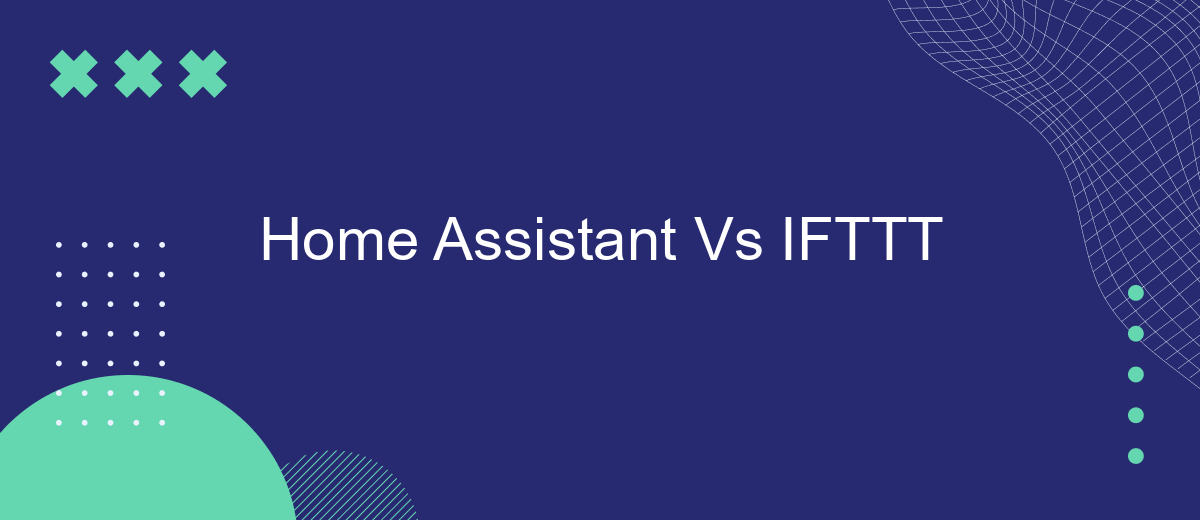When it comes to home automation, choosing the right platform can significantly enhance your smart home experience. Home Assistant and IFTTT are two popular options, each offering unique features and capabilities. This article aims to compare these platforms, highlighting their strengths and weaknesses to help you decide which one best suits your needs for seamless and efficient home automation.
Introduction
In today's technologically advanced world, automating everyday tasks is becoming increasingly essential for both personal and professional environments. Home Assistant and IFTTT are two popular platforms that offer powerful automation capabilities. While both platforms aim to simplify and enhance your smart home experience, they have distinct features and functionalities that cater to different needs and preferences.
- Home Assistant: An open-source platform that allows for extensive customization and supports a wide range of devices and services.
- IFTTT (If This Then That): A user-friendly platform designed to connect different apps and devices through simple conditional statements known as "applets."
Choosing between Home Assistant and IFTTT can be challenging. Each platform has its strengths and weaknesses, making them suitable for different types of users. For instance, Home Assistant is ideal for tech-savvy individuals who enjoy tinkering with code and custom settings, while IFTTT is perfect for those who prefer a straightforward, plug-and-play approach. Additionally, services like SaveMyLeads can further enhance your automation setup by streamlining the integration process, ensuring that your smart home operates seamlessly.
Overview of Home Assistant and IFTTT

Home Assistant and IFTTT are two popular platforms designed to enhance smart home automation. Home Assistant is an open-source platform that allows users to control and automate their smart home devices locally. It supports a wide range of devices and services, providing a high level of customization and privacy since all data is stored locally. Home Assistant is known for its robust community support and frequent updates, making it a versatile choice for tech-savvy users who prefer detailed control over their smart home environment.
IFTTT (If This Then That) is a web-based service that simplifies automation by allowing users to create chains of conditional statements called "applets." These applets enable various devices and services to interact with each other seamlessly. IFTTT is user-friendly and requires minimal technical knowledge, making it accessible to a broader audience. For those looking to integrate multiple services effortlessly, platforms like SaveMyLeads can be invaluable. SaveMyLeads helps streamline the integration process, ensuring that different apps and devices work together smoothly without requiring extensive manual configuration. Both Home Assistant and IFTTT offer unique advantages, catering to different user needs and preferences in the smart home ecosystem.
Key Differences Between Home Assistant and IFTTT

Home Assistant and IFTTT are both popular tools for home automation, but they cater to different needs and preferences. Home Assistant is an open-source platform that offers extensive customization and control, while IFTTT is a user-friendly service that connects various apps and devices with simple "if this, then that" rules.
- Customization: Home Assistant allows for deep customization and complex automation scripts, whereas IFTTT focuses on simplicity and ease of use with predefined applets.
- Local vs Cloud: Home Assistant primarily operates locally, which enhances privacy and reduces latency. IFTTT, on the other hand, is a cloud-based service, which might introduce delays and privacy concerns.
- Integration: Home Assistant supports a wider range of devices and services through community-driven integrations. IFTTT supports many popular services but may lack the depth and variety of Home Assistant.
- Complexity: Home Assistant requires more technical knowledge to set up and maintain, while IFTTT is designed for users with minimal technical skills.
- Advanced Features: Home Assistant offers advanced features like dashboards, detailed analytics, and local control. IFTTT focuses on straightforward automation without the need for in-depth configuration.
For those looking to streamline the integration process, services like SaveMyLeads can be beneficial. SaveMyLeads automates the transfer of data between various platforms, making it easier to set up and manage integrations, especially for users who prefer the simplicity of IFTTT but need more robust data handling capabilities.
Pros and Cons of Home Assistant and IFTTT

Home Assistant and IFTTT are both popular platforms for automating smart home devices, but they have distinct advantages and disadvantages. Home Assistant is known for its flexibility and extensive customization options, while IFTTT is celebrated for its simplicity and ease of use.
Home Assistant requires a bit more technical expertise to set up and configure, but it offers a powerful and highly customizable solution for those willing to invest the time. On the other hand, IFTTT provides a user-friendly interface that allows for quick and easy automation without needing advanced technical skills.
- Home Assistant Pros: Highly customizable, open-source, supports a wide range of devices.
- Home Assistant Cons: Requires technical knowledge, steeper learning curve.
- IFTTT Pros: Easy to use, quick setup, integrates with many popular services.
- IFTTT Cons: Limited customization, fewer advanced features.
For those looking for a middle ground, services like SaveMyLeads can help streamline the integration process, making it easier to connect various apps and automate workflows without extensive technical knowledge. Choosing between Home Assistant and IFTTT ultimately depends on your specific needs and technical comfort level.
Choosing the Right Platform for Your Needs
When deciding between Home Assistant and IFTTT, it's essential to consider your specific needs and technical proficiency. Home Assistant is an open-source platform that offers extensive customization and control over your smart home devices. It's ideal for tech-savvy users who are comfortable with a more hands-on approach to automation, including setting up integrations and writing custom scripts. Home Assistant provides a robust community and numerous add-ons, making it a powerful choice for those who want deep integration and flexibility.
On the other hand, IFTTT is designed for ease of use, offering a more straightforward and user-friendly experience. It allows you to create simple "if this, then that" automation rules without any coding knowledge. IFTTT is perfect for users who prefer a quick and easy setup. For those looking to streamline their automation processes further, services like SaveMyLeads can be incredibly beneficial. SaveMyLeads helps automate lead generation and data transfer between various platforms, complementing the simplicity of IFTTT by reducing manual tasks and enhancing productivity.
FAQ
What are the main differences between Home Assistant and IFTTT?
Can Home Assistant and IFTTT be used together?
Which platform is better for privacy and security?
Is there a cost associated with using Home Assistant or IFTTT?
What kind of integrations can I expect from Home Assistant and IFTTT?
SaveMyLeads is a simple and effective service that will help you automate routine tasks and optimize business processes. Stop wasting time uploading leads from Facebook manually – you can do it automatically, saving a lot of time and money. Eliminate routine from workflows and achieve more with minimal investment of money, effort and human resources.
